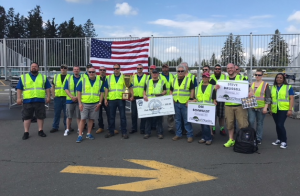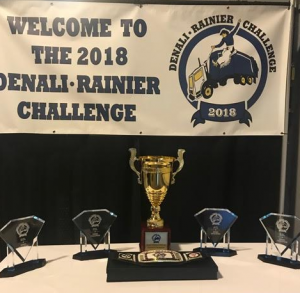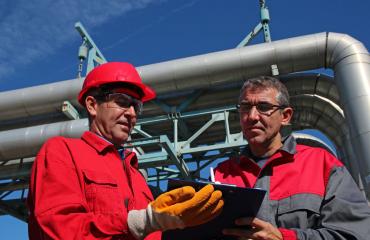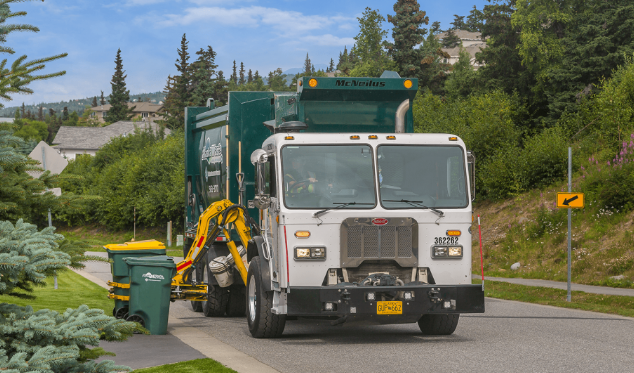
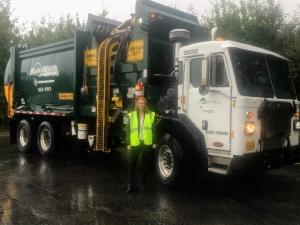
By Tonya Mott
Why am I hanging with Alaska Waste? A couple of reasons:
1. Servant Leadership – I’m on a mission to learn how to be the best leader I can be and help others do the same. As you read, you’ll find out why I would be learning this from employees at Alaska Waste.
2. Safety, from a risk management perspective – According to the 2016 Census of Fatal Occupational Injuries, the garbage collection industry is the 5th most dangerous in America. Of course, that means I must go for a ride on a garbage truck, living on the edge!
In Part 1 of this series, I talked about Alaska Waste’s management style, Servant Leadership. For part 2, I want to explain how that ties into occupational safety for their employees and the public. If you didn’t catch the first article, you can check it out here: Part 1 – Servant Leadership
Now to the fun part; I was invited to go for a ride along in a garbage truck!
I wish I could say I actually got to drive the truck, but I left the driving to the professionals!
Meet Dee:
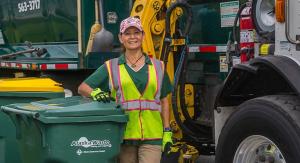
Dee started as a Swamper in the 80’s and, after having fun with that for seven years, she started driving her own truck. Today, 30 years later, she is one of Alaska Waste’s most respected and trusted drivers. She is the sweetest, toughest woman you will ever meet.
Our day started with a team safety tailgate meeting. They begin with stretching and then go over the plans for the day, discuss any necessary business, and lastly reiterate the importance of being engaged, aware of your surroundings, and keeping the general public and themselves safe.
I rode around with Dee for about four hours picking up garbage cans. When I type it out it sounds simple. It’s not. This job required a heightened sense of awareness for what’s happening around you at all times. You check your mirrors once, and then you check them again before making any moves. You are constantly watching for pedestrians, school kids, bicyclist, animals, and anyone that may be approaching the truck. In addition, because you are driving the equivalent of a monster truck, traffic safety is a must. Our winters are dark; 9 to 10 months out the year our road conditions are not ideal. It’s imperative to watch out for the drivers around you and the moves they are making. Distracted driving is not tolerated. There is no eating, drinking, talking/texting on cell phones, completing paperwork, reading, etc. while operating the trucks. To make this a habit, Dee follows these rules even when driving her personal vehicle.
As we moved from can to can, Dee would occasionally get out of the truck to move a can in a safe spot so that she could pick it up. It may have been too close to a vehicle or a building and she didn’t want to take any chances. There were also a couple instances where the client clearly had trash that needed to be picked up but they didn’t pull the can to the end of the driveway. She recognized that with school starting that parents may be overwhelmed and she didn’t mind pulling the cans out and making sure they got dumped. On to the next, she noticed when setting down a can after dumping it, that it had a large split down the middle. She immediately notified dispatch and requested that they send out a new one. She clearly takes pride in her work and cares about the clients.
Why would Dee care so much about her job and doing what’s right by the client? Based on my conversation with Dee, my opinion is this is all due to Alaska Waste’s management style. Dee said if a driver has an incident out on the road, whether it’s a car accident, an injury, etc. they call their management team and they rush out to be by their side and help them through the issue. They do not leave them alone to fend for themselves during a time when they need support the most. Managers are humble and welcome being called out if they make a mistake, sharing their own mistakes with the entire team so that everyone can learn from them. The culture organically creates a place for colleagues to point out to each other, with no qualms on either side, when a mistake is being made that could potentially be unsafe. They know it is for all the right reasons and they are ultimately looking out for their fellow co-workers safety and wellbeing. They clearly define Work Family.
Speaking of family, in part 1, I wrote about Josh James, the Operations Manager. When we were discussing servant leadership and what that entails, he told me that every year he writes a letter to his employee’s families, sharing appreciation for the employees’ hard work and vowing to make sure that they come home safely to their families every day.
In closing, shout out to Josh, Dee, and Alaska Waste for allowing me the privilege to come in and learn the operations first hand. I’m envious of what you have created and will do my best to replicate this in my professional and personal life.
On another note:
Congrats, to Alaska Waste driver’s for winning the Denali – Rainier Truck Rodeo District Champion amongst many other awards this year! To top it off, the Waste Connections annual Truck Rodeo Challenge will be in Alaska next year!
